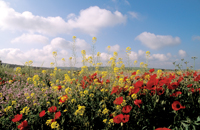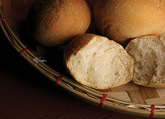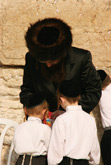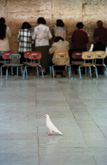×


We have detected your country as:
Please click here to go to the USA website or select another country from the dropdown list.

{image_1} Spring in Israel is a remarkably colorful season, compared to the rest of the year. Many of Israel’s wildflowers cease blooming in summer, fall (autumn), and winter, but burst forth in a blaze of glory at the arrival of spring. Lively yellow, white, purple, blue, orange, and red blossoms pop up amid green carpets that cover the usually
dry and rocky soil of the Promised Land.

{image_1}
Although the word technically means “to make sour,” most dictionaries define chametz as any flour of the five species of grain, which is mixed with water and allowed to ferment before being baking. The five species of grain are wheat, spelt, oats, barley, and rye. Some dictionaries define chametz simply as yeast or leaven. The word is mentioned over a dozen times in the Old Testament, and it traditionally takes on the most significance during the feast of Pesach (Passover). The Torah (Gen.–Deut.) requires that chametz not be eaten nor found in one’s home or among one’s possessions during Pesach (Exod. 12:18–20). The sages go so far as to teach that it should not even be looked upon during the festival season.
Continue Reading »
{image_1} Simcha (pronounced sim-CHAH) is a word of many meanings. From the root word sameyach, it means glad, happy, or joy. “Serve the LORD with gladness [simcha]; come before His presence with singing” (Ps. 100:2). Note that in Hebrew or English, this is a command. How often have the Jewish people faced devastating circumstances with an inner joy drawn from their foundational focus on the Divine? This inner joy produces fortitude and strength.
Continue Reading »
By Teri Riddering, Coordinator, BFP Spanish Resource Center
{image_1} Some Christian theologians report that the generic term eretz, for “land,” is the fourth most frequently used noun in the Old Testament (the Jewish Scriptures), used 2,504 times in the Hebrew sections and 22 times in the Aramaic sections. The general use of this term refers to the Earth in the cosmological sense, but it is also the designation of a specific territory, primarily the Land of Israel.
Continue Reading »
{image_1} Segulah is used eight times in the Hebrew Scriptures. Six of those times, it refers to Israel (Exod. 19:5; Deut. 7:6, 14:2, 26:18; Ps. 135:4; Mal. 3:17). It is translated in various Bible versions as peculiar treasure, special treasure, or treasured possession. One commentator defined it as “property in the special sense of a private possession that one personally acquired and carefully preserves.” Rabbi Sheldon Marder, on MyJewishLearning.com, gives Rabbi Hirsch’s definition (19th-century) as an “exclusive possession to which no one else except its owner is entitled and which has no relationship to anyone except its owner.”
Continue Reading »
By Teri Riddering, Coordinator, BFP Spanish Resource Center
{image_1}In Hebrew, words have a very intriguing way of interrelating, depending on the basic structure of the word and the different connotations of the same root letters. For example, the Hebrew letters shin-mem-shin [שמש ] form shemesh, the word for “sun,” and shamash, the word for “servanthood.” The vowels are different, but the consonants are the same, forming what is called a root word. Looking at words that share the same root letters is something that is commonly done in the Hebrew word study of the Scriptures by Jewish scholars. So, is there a relationship between shemesh and shamash?
Continue Reading »
{image_1}
On a first reading of Leviticus 21, it seems that all it’s about is a list of restrictions placed on the priests by God in order for them to serve Him in the tabernacle. The High Priest had the most restrictions. From this, we learn that the closer to that most intimate place with God, the Holy of Holies, the more holy one had to be. As believers in Yeshua (Jesus), we yearn to be in an intimate place with God…and we are. Yeshua is our righteousness (2 Cor. 5:21), and we can enter boldly into the throne of grace (Heb. 4:16). God’s love is eternal, we are forgiven, and nothing can snatch us out of His hand (John 10:28). However, what about our love for Him? Unfortunately, our love has the ability to grow cold (Matt. 24:12), and we find that often we are not as close to Him as we should be or would like to be.
Continue Reading »
{image_1}Freedom and liberty. Some have said that these are two of the most important words in any language. Others would say that, in recent history, they are two of the most overused and misunderstood words in any language. Certainly the concepts that they represent have been in the forefront of mankind’s thinking in every generation since Adam and Eve had their unfortunate snack in the Garden. Millions have lost their lives in their defense, and others in their pursuit. World War Two alone saw the death of 72 million as Hitler’s forces sought to triumph over the free world. Today, we hear reports daily of the loss of lives virtually all over the world as those who would tyrannize humanity are confronted by those who will not be tyrannized.
Continue Reading »
{image_1}What was the first thing that God made during His 6-day process of creation? He created light (“or”), and not because He needed light to see by, but because His original heavens and earth were still dark and void, and His future creation would need light to live and subsist by. When God said, “‘Let there be light’; and there was light” (Gen. 1:3)—or in Hebrew, “Yehi or, vayehi or”—His very words caused the light to come forth from His countenance and expel the darkness. “LORD, lift Thou up the light of Thy countenance upon us” (Ps. 4:6b, KJV). His light now reached into the darkest depths of the universe.
Continue Reading »
{image_1}If any place in the world needs peace—cessation of strife, murder, and hatred—it is the Middle East.
Continue Reading »All logos and trademarks in this site are property of their respective owner. All other materials are property of Bridges for Peace. Copyright © 2024.
Website Site Design by J-Town Internet Services Ltd. - Based in Jerusalem and Serving the World.